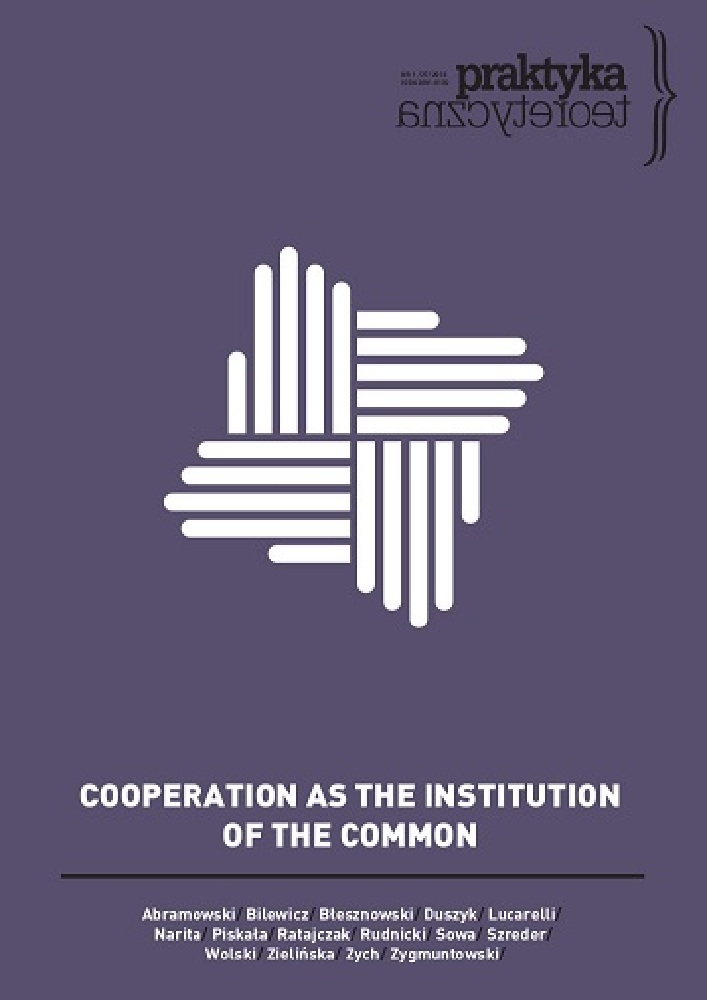Abstract
A review of Pierre Dardot and Christian Laval’s book Commun: essai sur la révolution au XXIe siècle. Following a manuscript published by the author at Pós Ciências Sociais (a peer-reviewed journal on the social sciences of Federal University of Maranhão – Brazil), in this text the author discusses Dardot and Laval’s approach to the problem of the common in light of both their theoretical path and the contemporary political impasses of neoliberal capitalism. In this sense, three main axes are articulated in this text: the institution of the common, neoliberal rationality and the problem of governmentality.References
Audier, Serge. 2015. Penser le “néolibéralisme.” Lormont: Le Bord de l’Eau.
Bollier, David, and Silke Helfrich (eds.). 2012. The wealth of the commons: a world beyond market and state. Amherst: Levellers Press.
Boltanski, Luc, and Ève Chiapello. 2011. Le nouvel esprit du capitalisme. Paris: Gallimard.
Bove, Arianna, Annalisa Murgia, and Emiliana Armano. 2017. Mapping precariousness, labour insecurity and uncertain livelihoods. London: Routledge.
Braidotti, Rosi. 2013. The posthuman. London: Polity.
Colebrook, Claire. 2014. Death of the posthuman I. London: Open Humanities Press.
Dardot, Pierre, and Christian Laval. 2016a. A nova razão do mundo: ensaio sobre a sociedade neoliberal. Trans. Marianna Echalar. São Paulo: Boitempo.
Dardot, Pierre, and Christian Laval. 2016b. Ce cauchemar qui n’en finit pas: comment le néolibéralisme défait la démocratie. Paris: La Découverte.
Dardot, Pierre, and Christian Laval. 2015. Commun: essai sur la révolution au XXIe siècle. Paris: La Découverte.
Davis, Mike. 2006. Planet of slums. New York: Verso.
De Angelis, Massimo. 2017. Omnia sunt communia: on the commons and the transformation to postcapitalism. London: Zed Books.
Douzinas, Costas. 2017. Syriza in power: reflections of an accidental politician. London: Polity.
Dyer-Whiteford, Nick. 1999. Cyber-Marx: cycles and circuits of struggle in high-technology capitalism. Urbana: University of Illinois Press.
Foucault, Michel. 2004. La naissance de la biopolitique. Paris: Gallimard.
Fraser, Nancy. 2017. “The end of progressive neoliberalism.” Dissent Magazine January 2. https://www.dissentmagazine.org/online_articles/progressive-neoliberalism-reactionary-populism-nancy-fraser
García Canclini, Nestor. 1995. Consumidores y ciudadanos. Buenos Aires: Grijalbo.
Hardt, Michael, and Antonio Negri. 2017. Assembly. Oxford: Oxford University Press.
Harvey, David. 2003. The new imperialism. Oxford: Oxford University Press.
Koonings, Kees, and Dirk Krujit. 2009. Megacities: the politics of urban exclusion and violence in the Global South. London: Zed Books.
Laclau, Ernesto, and Chantal Mouffe. 2014. Hegemony and socialist strategy: towards a radical democratic politics. New York: Verso.
Laval, Christian. 2018. Foucault, Bourdieu et la question néolibérale. Paris: La Découverte.
Lemke, Thomas. 2002. “Foucault, governmentality, and critique.” Rethinking Marxism 14(3): 49–64.
Mattei, Ugo. 2011. Beni comuni: un manifesto. Bari: Laterza.
Mayer, Margit. 2013. “Urbane soziale Bewegungen in der neoliberalisierenden Stadt.” Sub/Urban 1(1): 155–168.
Milun, Kathryn. 2011. The political uncommons: the cross-cultural logic of the global commons. London: Routledge.
Morelock, Jeremiah, and Felipe Ziotti Narita. 2018. “Public sphere and world-system: theorizing populism at the margins.” In Critical theory and authoritarian populism. Ed. M. Jeremiah. London: University of Westminster Press. (forthcoming)
Narita, Felipe Ziotti. 2018. “Para uma nova figuração da praxis: a teoria social e o princípio do comum.” Pós Ciências Sociais 15(29): 289–295.
Negri, Antonio. 2015. El poder constituyente. Trans. Simona Frabotta, Raúl Cedillo. Madrid: Traficantes de Sueños.
Negri, Antonio. 2014. “La metafisica del commune.” Il Manifesto May 5.
Patnaik, Utsa, and Prabhat Patnaik. 2016. A theory of imperialism. New York: Columbia University Press.
Rosanvallon, Pierre. 1999. Le capitalisme utopique. Paris: Seuil.
Sarlo, Beatriz. 2010. Tiempo presente: notas sobre el cambio de una cultura. Buenos Aires: Siglo XXI.
Stengers, Isabelle. 2015. In catastrophic times: resisting the coming barbarism. Trans. Andrew Goffrey. London: Open Humanities Press.
Streeck, Wolfgang. 2017. “The return of the repressed.” New Left Review 104. https://newleftreview.org/II/104/wolfgang-streeck-the-return-of-the-repressed
Szadkowski, Krystian. 2017. “The university of the common: beyond the contradictions of higher education subsumed under capital.” In The future of university education. Eds. M. Izak, M. Kostera, and. M. Zawadzki. London: Palgrave Macmillan.
Wacquant, Loïc. 2012. “Three steps to a historical anthropology of actually existing neoliberalism.” Social Anthropology 20(1): 66–79.
Zukerfeld, Mariano. 2017. Knowledge in the age of digital capitalism: an introduction to cognitive materialism. London: University of Westminster Press.
License
“Theoretical Practice” seeks to put into practice the idea of open access to knowledge and broadening the domain of the commons. It serves the development of science, thinking and critical reflection. The journal is published in open-access mode under the CC-BY-NC-SA 4.0 license (detail available here: http://creativecommons.org/licenses/by-nc-sa/4.0/). Articles published in the journal may be freely distributed, stored, printed and utilized for academic and teaching purposes without restrictions.
They should not be, however, used for any commercial purposes or be reconstructed into derivative creations. Access to the journal may not be limited or offered for a fee by any third party.
Prospective authors are obliged to fill in, sign and send back the publishing contract compliant with the CC licencing. [PL.pdf, PL.doc, EN.pdf,EN.doc].
According to this contract, authors grant the journal a non-exclusive right to publish their work under the creative commons license (CC-BY-NC-SA 4.0) without any financial obligation on both sides of the contract.
Before submission authors should make sure that derivative materials they use are not protected by copyright preventing their non-commercial publication. Authors are responsible for any respective copyright violations.
